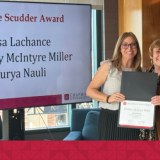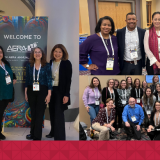CES Represents at CASP
March 21, 2012
The Counseling and School Psychology faculty along with five doctoral students and ten Ed.S. students will be presenting at the California Association of School Psychologists (CASP) spring conference from March 21st to the 23rd.
Two of our own Doctoral student, Stephanie Domzalski and Courtney Matz, are co-chairs of the conference.
With faculty, the CSP group accounts for 14 workshops, papers and posters. Way to represent the CES!
Here is a list of the presentations from the CSP group at CASP:
Strategies for Individual Counseling with LGBTQ Students
Kelly S. Kennedy, Ph.D.
Assistant Professor
School-based mental health professionals have the opportunity to support LGBTQ students during a potentially stressful time of life. By becoming more knowledgeable about LGBTQ identity development, by recognizing the phenomena of oppression, discrimination, and homophobia/biphobia/transphobia, and by viewing students as whole people comprised of many characteristics (with sexuality and gender identity being one part), school psychologists can better support LGBTQ students. Listening, validating, and normalizing experiences are critical, along with helping students navigate the disclosure process and ensuring that students stay safe from others and themselves. Most of all, professionals can instill a sense of hope that students will successfully navigate the challenges of adolescence, and will feel happy and confident in themselves. Unfortunately, few school psychology training programs fully prepare practitioners to conduct counseling with LGBTQ students. The primary goal of this workshop is to supplement practitioners’ counseling skills and prior knowledge of the LGBTQ population in ways that enable them to gain the competency needed to provide competent counseling services for LGBTQ students.
A Solution Focused Approach to Counseling and Mental Health Interventions
Michael Hass, Ph.D.
Professor
Solution Focused Brief Therapy (SFBT) is a flexible approach to counseling that focuses on building solutions from clients’ resources and strengths. It is collaborative, positive and future orientated. This workshop will introduce participants to SFBT and the interviewing skills necessary to establish rapport, collaboratively establish specific goals, identify client strengths and resources, and develop out-of-session tasks.
Participants will:
- Understand the “common factors” research on effective counseling and psychotherapy.
- Understand the role of non-evaluative listening
- Develop a “future focus”
- Assist clients to develop realistic and achievable goals and action plans for successfully achieving those goals.
- Identify “exceptions” to a problem and leverage these exceptions for client change
- Match communication and tasks to a client’s readiness for change.
- Match tasks to common psychosocial problems
- Evaluate progress towards goals
Making Counseling Count
Jaime Flowers, school psychologist, Fullerton Joint Union School District; Stephanie Domzalski
CES Doctoral students
The field of school psychology is moving towards a data based decision model (Merrel, Erwin, and Gimpel, 2006). Implementing data based decision making in all service delivery areas is important and this includes direct instruction service (DIS) counseling and psychological services. This will insure that practitioners monitor progress on interventions and continue to problem solve when intervention do not work (Merrel, et al., 2006). Best practice is a combination of short-term goal directed counseling in a data based decision model, which will replace practices such as checking in with a student once a month (Bruce & Hopper, 1997).
Promoting Resiliency/Reducing Risk: Meeting the Mental Health needs of Sexual Minority Youth
Christine Toleson, Designated School Psychologist Fostered Youth Program, Los Angeles Unified School
CES Doctoral Student
This interactive mini-skills workshop will provide an overview of the different environmental stressors that contribute to sexual minority youths’ heightened risks for mental health issues. The first half of the workshop will focus on what research suggests regarding risks and promoting resiliency for sexual minority youth. Participants will participate in an activity aimed at increasing sensitivity and developing terminology that is empowering for sexual minority youth. Participants will be taught specific skills that providers can use to promote resiliency for sexual minority youth. Learning outcomes will be an increased understanding of the challenges that sexual minority youth face at school and increased competency in best practices that service providers can take to promote positive outcomes for all youth.
Consulting in Academic Motivation Cases
John Brady, Ph.D.
Professor
The goal of this workshop is to increase the participant’s skills in consulting with teachers, students and parents in cases where the student lacks academic motivation. Lack of academic motivation is one of the main causes of poor school performance both in general education and special education and one of the most common referral conditions for school psychologists and other specialists. Since these cases are so resistant to change the consultant who works with these students must pursue a comprehensive approach to the student parents and family. The workshop will present the fundamentals of an approach to successfully working with these students. The participants will learn strategies and interventions which will help them become more successful in consulting with cases that entail problems in academic motivation.
Accommodations for the Selectively Mute Child; How to Help the Classroom Teacher Provide Tier One Interventions, When a Child is Not Speaking in the Classroom
Chris Ellis, School Psychologist, Los Angeles Unified School District, CES Doctoral Student; Randy Busse, Ph.D., professor
Traditionally selective mutism has been diagnosed and treated in the clinic setting. But since by definition selective mutism occurs when a child speaks in one setting such as home and not in another setting such at school, it often first occurs in the school setting. Selective mutism is associated with anxiety so helping the child feel comfortable in the school setting will fall most logically on the classroom teacher. It is the teacher that is in the foremost position to create a safe environment and reduce the anxiety of the child that is not speaking in their classroom. This workshop will help the school psychologist acquire the tools (tier one interventions), to help the teacher provide a safe environment where the child will feel safe to talk and can learn to avoid reinforcing the behaviors that support the mutism.
Cutting and Self-Injury: A Behavioral Approach
Arezu Iranipour, school psychology graduate student, Chapman University.
Addressing Social Aggression in Schools
Brianna Meshke, Christina Trolli, school psychology graduate students, Chapman University.
Supporting Students from Military Families
Brianna Meshke, graduate student, Chapman University.
Strategies to Promote Healthy Body Image and Prevent Eating Disorders
Christina Veatch, Rachel Round and Katie Van Sickle, graduate students, Chapman University.
Small-group intervention strategies to use for students with executive function difficulties
Supieri Molly Siprasoeuth, Tanya J. Perez; school psychology graduate students, Chapman University.
The Relations of Self-Regulation to Chinese American Children’s Empathy and Social Competence: Implications for School Psychologists
Charlene Sum, graduate student, Chapman University.
Educating Gifted Students: Evidence-Based Interventions in a Three-Tier Framework
Rachel Round, Christina Veatch, Katie Van Sickle, school psychology graduate students, Chapman University.
Trichotillomania: Intervention and Progress Monitoring Using Single Case Methodology
Courtney Matz, School Counselor and Ph.D. student, Chapman University, Torrance Unified School District; Stephanie Domzalski, M.A., NCSP, LEP; Randy Busse, PhD, Professor, Chapman University.

